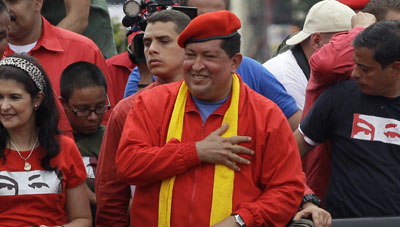In more than a decade in power, President Hugo Chávez Frías has overseen the transformation of nearly every aspect of Venezuelan society, including the media. When Chávez came to office in 1999, he enjoyed the support of the country’s established private media. But the relationship soon soured, and in April 2002 he was briefly deposed in a coup that he alleges was carried out with the support of key media owners. Today, several of the most critical media outlets are either gone or scared into silence, and a vast state media presence echoes the government’s positions. By Joel Simon
The highly polarized presidential campaign under way in Venezuela pits Chávez against former Governor Henrique Capriles Radonski. The polarization is dramatically reflected in the press, with the private media largely backing Capriles and the state media mounting a full-throated appeal in support of Chávez. The cacophony drowns out meaningful debate, and in the context of the electoral campaign the public is the loser. Through its massive state media presence and its use of censorship, legal harassment, and administrative sanctions, the Chávez government sets clear limits on public dissent, as this report shows.
More in this report
• Press under assault
• State media target critics
• Globovisión harassed
• Hackers hound press
Audio report
• Media under seige
In print
• Download the pdf
In other languages
• Español
This is CPJ’s fourth special report on Venezuela since Chávez took office; reading them in sequence paints a clear picture of just how dramatically the media environment has declined during this period. The first report, “Radio Chávez,” published in February 2001, described a vibrant media scene in which the president with increasing frequency took over the airwaves to deliver long-winded diatribes on everything from “the joys of having a girlfriend to ‘the revolutionary process in the universities.’” It ended by noting ominously, “[I]f all revolutions eat their young, Venezuelan journalists had better hope that Chávez doesn’t get too hungry.”
The second report, called “Cannon Fodder” and published following the failed 2002 coup attempt, described a series of physical attacks in which beat reporters “caught between Venezuelan President Hugo Chávez Frías’ inflammatory rhetoric and the active political role that media publishers and editors have taken find themselves victims of attacks from the public.”
CPJ’s third report, 2007’s “Static in Venezuela,” recounted in detail the government’s failure to renew the license of critical broadcaster RCTV and demonstrated how the deepening media crackdown was provoking sweeping self-censorship. In the years since that report was published, RCTV has been silenced along with dozens of other critical broadcasters; journalists have been jailed for allegedly defaming officials; and regulators, together with a judiciary closely allied with the executive, have imposed censorship on sensitive coverage.
The decline of Venezuelan journalism has broad implications not only for the country, but for Latin America as a whole. Nearly all of Chávez’s strategies to rein in and isolate critical journalists have been emulated by sympathetic governments across the region, from Nicaragua to Ecuador. Today, Venezuela is part of a bloc of counties within the Organization of American States looking to dismantle its system of human rights protection, including the Inter-American Commission on Human Rights and its special rapporteur for freedom of expression.
In the 1980s, as Latin America turned to democracy after a decade of brutal dictatorships, electoral politics took hold across the region. Chávez himself won at the polls and took office with widespread support from the Venezuelan public. But he has used his time in office to undermine rather than develop the institutions of democratic government.
With Chávez battling cancer, he must confront his legacy. While he focuses on consolidating the Bolivarian Revolution, Chávez’s failure to support and nurture independent institutions—including the media—has the potential to undermine the legitimacy of the upcoming elections. Regardless of who prevails at the polls, rolling back a decade of media repression and fostering a climate that is more open and more tolerant will be a key challenge for the next administration.
Joel Simon is the executive director of the Committee to Protect Journalists. He has written widely on media issues, contributing to Slate, Columbia Journalism Review, The New York Review of Books, World Policy Journal, Asahi Shimbun, and The Times of India. He has led numerous international missions to advance press freedom.
